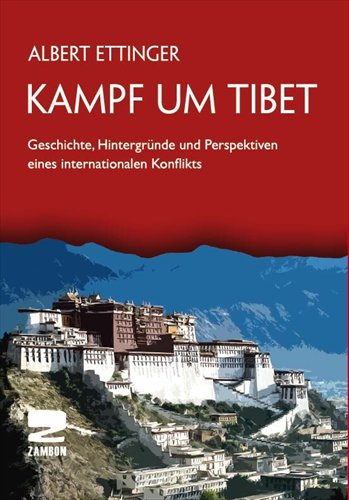I want to give Europeans an understanding of the real Tibet: Westerner
Recently, there are two books that have risen to fame among German Tibetologists. One is called "Free Tibet? State, society and ideology in the real existing Lamaism" and the other "Fight for Tibet: history, background and perspectives on an international conflict".
Both books use a lot of data, pictures and scholars' discussions to expose the many lies of the "Dalai Lama". Almost all buyers of these books gave a five-star review, with one critic saying "it destroyed a myth".
The author of the book, Ettinger, said in a recent interview with the People's Daily, "Can you believe it? Before the founding of the People’s Republic of China, the West paid very little attention to Tibet. Moreover, they looked at Tibet in a condescending manner and were largely critical of the living and social conditions at the time in Tibet."
His reason for saying this is because he has read a lot of Western books, archives and literature about Tibet. There are dozens of books on Tibet in his study; English, French, German and even Chinese books with each one carefully labeled.
Before he retired, Mr. Ettinger was a secondary school teacher. During his time teaching he noticed that books on Tibet were particularly vague and favored the Dalai Lama’s version, which made him suspicious. Later, he read some German books on Tibet and found that they were out and out propaganda on behalf of the Dalai Lama.
During the 2008 Olympic torch relay, the attack by so-called "Tibet Support Groups" led to further indignation. Aren't they supposed to advocate peace? Why attack the torch? Since then, the idea of investigating the real situation sprung to mind and, with support and encouragement of his son’s Chinese teacher and the Chinese embassy staff in Luxembourg, he began investigating and gathering information. The book was eventually published in 2014.

"I wrote these two books aiming to give European people’s an understanding of the real situation in Tibet," said Ettinger. "At the same time, I also wanted to provide Europe’s youth with the revelation that matters should be looked at objectively."
He set an example so that Europeans can change their "preconceived" biases and look at Tibet objectively. He has never been to Tibet and can't speak Chinese or Tibetan, but he has read a lot. He has spent time reading almost all books on Tibet, regardless of which language they are written in.
"Europeans have a prejudice against the Chinese government and choose to believe the Dalai Lama over the Chinese government. To this end, my books only cite the articles of Western academics. Surely you readers have to believe the words of your own academics?!"
In addition, he also found photographs by Himmler's delegation to Tibet during Nazi Germany at the German National Archives. He used these photos in his book to compare them to current images of Tibet. Sometimes pictures are more persuasive then words; by comparing old and new photographs of Tibet, readers can pass their own judgment.

In reference to the two books, Ettinger explained that "Free Tibet?" is primarily a comparison between the Dalai Lama's and the author's own understanding of events before and after the founding of the People’s Republic of China.
"The Dalai Lama is very good at propaganda. With the help of Hollywood, he is not only a religious leader, but has also become a celebrity that flaunts freedom and peace," he said. "I'm not sure whether he actually believes everything he says, because there is much historical proof that speaks of his insincerity. I really don’t know what the truth is and what is insincere. Independent thinkers would surely understand that this kind of thing can't happen spontaneously, it must be organized and premeditated," he added.
"Fight for Tibet" mainly describes the origin of the so-called "Tibet independence" issue and Tibet history of 20th century.
He said, "The materials I read for reference indicate that there hasn't been a single country that has recognized 'Tibet independence'. Where does it say that the People's Liberation Army came to occupy Tibet?"
Also in his book, he explains to readers during China's Yuan, Ming and Qing Dynasties, Tibet had been formally under the jurisdiction of the central government. "Of course, due to remoteness and inconvenience of central management, Tibet has always retained a state of autonomy. But Europeans have never heard this; they simply see Tibet and Tibetan Buddhism as a kind of cultural symbol. My neighbors bought a Buddha figure to put in their courtyard claiming it's a supporter of the Dalai Lama, but they simply don't know it is very different between the true Tibetan Buddhism and the Buddha figure they bought."
Finally, he said, "I do all this voluntarily; I'm even willing to have a debate with supporters of 'Tibet independence'. For this, I'm extremely proud.
He also expressed his hope that these two books can be into translated into otherlanguages to give more people an understanding of a real Tibet.

Your Comment
Name E-mailRelated News
-
;
-
-
Books presented to Taiwanese to show a real Tibet
On the morning of May 26th, the delegation of China Tibetology Research Center paid a visit to the library of the Kun Shan University of Technology in Taiwan and donated books on Tibetology to the library.
-
-
-
Feature: showing tourists a real Tibet
The life of an aid-Tibet guide is tough, but Liu Menggang says, "My wish is simply to give good service to each and every tourist, and to inspire other tour guides to do the same. I think my hard work is really worth it."
-
-
-
Wrapup: Tibetan Culture Week concludes in Canada, leaving a legacy of showing real Tibet to the world
With the end of Thangka exhibition at the University of British Columbia in Vancouver on Nov.15,the China Tibetan Culture Week 2014 concluded in Canada.
-
Based in Lhasa, Tibet Vista is a Tibet travel agency that specialized in Tibet permit, and Tibet tours for both private and group travelers at a local price!
•4 Days Lhasa City Group Tour from USD 460 •8 Days Everest Base Camp Group Tour from USD 850 •15 Days Mt.Kailash Group Tour from USD 1780 •2016 Tibet Train Tours from Beijing, Shanghai, Chengdu, Xining,etc










